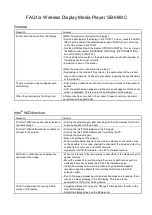
12/1/2006
34
Scenario 3 – Serial Auto Dial-in Using UDP
This example shows how to setup a serial auto dial-in session in UDP mode. The auto dial-in session is opened by the UDP client in
the 102PC-SE to the configured server on a configured port.
Once the session is opened, there can be two-way traffic between the serial device and the remote server.
•
You can switch from Command Prompt to Dial-in session using the restore session command.
•
You can switch from Dial-in session to Command Prompt using <escape-monitor-string>.
Auto Dial-in Feature in UDP Mode
Commands to Setup Auto Dial-In in Telnet Mode with the 102PC-SE
# set ip eth0 dhcp-client disable
# set ip eth0 ip-address 192.168.2.1
# set serial auto-dialin enable
# set serial s0 auto-dialin enable
# set serial s0 auto-dialin trig-mode dtr-char
# set serial s0 auto-dialin-ipaddress 192.168.2.10
# set serial s0 auto-dialin-port 23
# set serial s0 auto-dialin-protocol udp
# set serial s0 baud-rate 115200
# set serial s0 data-bits 8
# set serial s0 parity none
# set serial s0 stop-bits 1
# set serial s0 flow-control rts-cts
# save
Functionality
After booting, the SocketEthernet IP Module initiates a UDP Auto-dialin session to the configured server, depending on the
configured Auto-dialin trig mode settings.
1.
dtr: Upon detecting DTR on the serial port S0, it initiates the UDP session.
2.
char: Upon entering any character, it initiates the session. (Login string is associated with
this mode, so we need to enter the login string if it is not NULL to initiate the session).
3.
dtr-char: Either of the above cases.
4.
none: No dependency, the module initiates the session as soon as it boots up.
Notes:
1.
More than one Dial-in session cannot be opened at a time.
2.
No Authentication support.
3.
When, escape-monitor is enabled, care should be taken during data transfer for Escape
string occurrence in the data.
4.
Raw mode is not applicable.







































